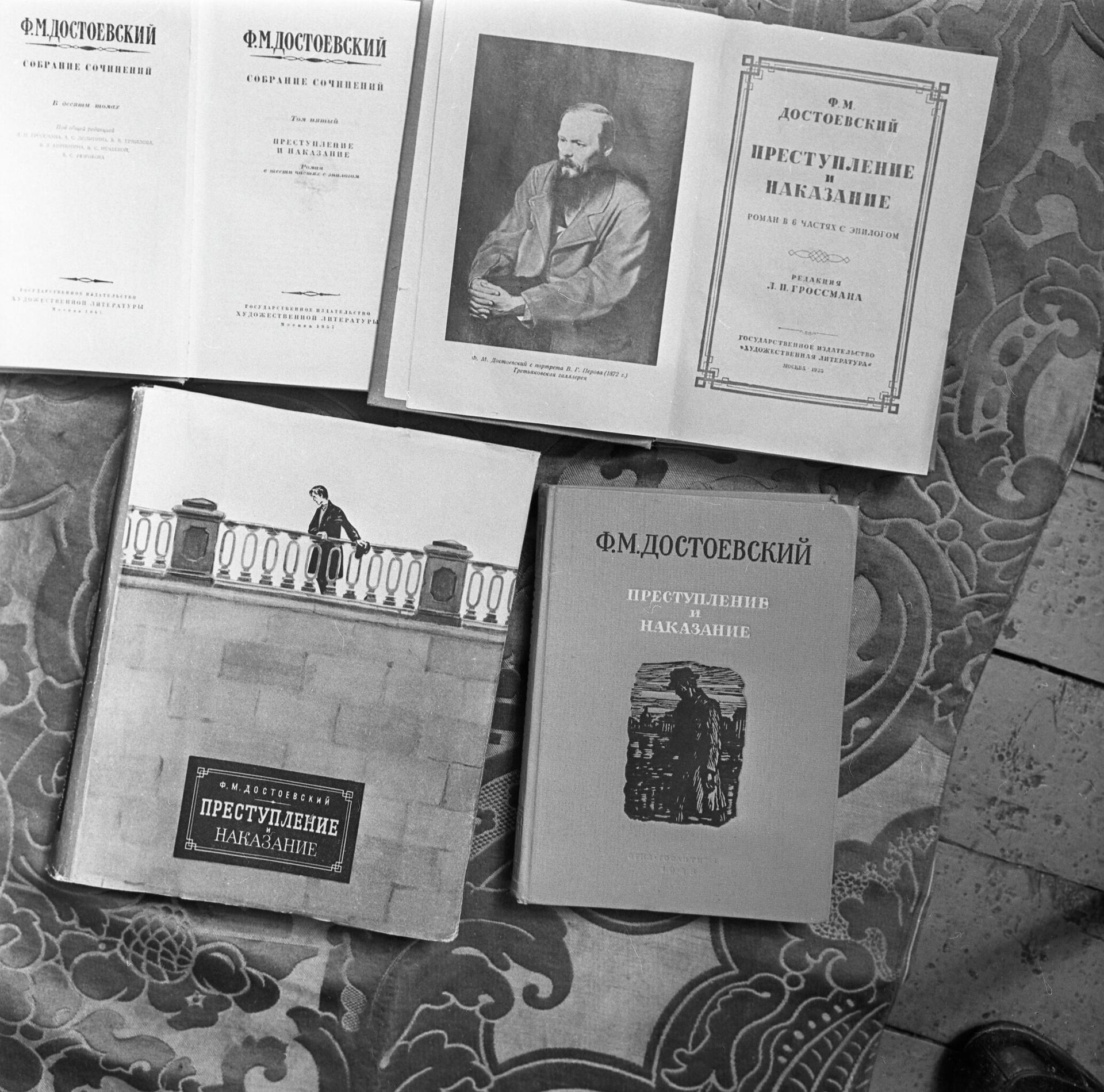https://sputnikglobe.com/20211111/epitome-of-russianness-world-marks-200-years-of-legendary-russian-author-fyodor-dostoevsky-1090651553.html
'Epitome of Russianness': World Marks 200 Years of Legendary Russian Author Fyodor Dostoevsky
'Epitome of Russianness': World Marks 200 Years of Legendary Russian Author Fyodor Dostoevsky
Sputnik International
Fyodor Dostoevsky is arguably one of the most renowned Russian authors when it comes to global admiration. His books have been translated into over 170... 11.11.2021, Sputnik International
2021-11-11T12:08+0000
2021-11-11T12:08+0000
2021-11-11T15:44+0000
fyodor dostoevsky
russia
literature
society
books
https://cdn1.img.sputnikglobe.com/img/07e5/0b/0b/1090653231_0:698:2048:1850_1920x0_80_0_0_28b84d146afb25eb83b667f29246b2fe.jpg
The 11th of November marks the bicentennial of Fyodor Mikhaylovich Dostoevsky - a Russian writer praised not only for his literary ingenuity, but also for his insight into what is known as "the mysterious Russian soul".Dostoevsky, who was born in 1821 and marked his creative path with around 50 literary works, appears to remain of interest not only to Russians but also to people from all around the world. Among his most prominent works are "Crime and Punishment", "The Brothers Karamazov", "The Idiot", "The Possessed", "The Gambler", and many others. For some, Dostoevsky is associated with the apocalyptic and gloomy spirit of his novels that take the reader to the dark streets of Saint Petersburg. Some immediately think of the cunning on-point language and style of his writing, while others recall some renowned philosophical remarks that still resonate today even though they were written nearly two centuries ago.'Russian Soul'Many foreign readers also leaf through the pages of Dostoevsky's novels in order to delve into the mysteries of the "Russian soul" - "as hackneyed as this notion may have become", as noted by Professor of Russian and Comparative Literature at University College London Maria Rubins.Yet, one should not rush to idealise the writer, according to the professor, because Dostoevsky is a complex and even controversial figure."The Orthodox framework is Dostoevsky's inevitable accoutrement and raison d'être. As opposed to Tolstoy, whose moralism can be occasionally circumvented to enjoy the sheer beauty of his writing, Dostoevsky's religious agenda cannot be ignored", she explains. "The Christian pathos is something that turns off some, myself included, while it also carries a special appeal to like-minded readers. His anti-Semitism is by far his most repulsive feature, one that marred not only his tendentious Diary of a Writer [A Writer's Diary] but also his masterpieces".Still, the texts continue to evolve even long after the author is gone, with new times offering new reading trajectories and interpretations. Thus, Rubins says, "Notes From the Underground" appeared to be appreciated for its insight into the subconscious, and today this narrative "seems to have foreshadowed the revision of human nature (or rather of the humanistic discourse) provoked by the unprecedented barbarism of the 20th century".Writer-PhilosopherWhile Dostoevsky is widely studied in schools and universities across the globe - and not only in the context of just Russian literature - the opportunity to use his works to get a glimpse into the "Russian soul" is not the only thing that draws modern readers to his novels and stories.Smith refers to Dostoevsky as "a writer-philosopher who probes his readers to think critically about [the] human condition and to develop empathy for others". However, she notes that he is "often pessimistic" - which is why she, for her part, relates more to Leo Tolstoy, another renowned Russian writer.One may not share the sentiment about Dostoevsky necessarily being "pessimistic" - for some, like Professor of English and Comparative Literature at Durham University Alastair Renfrew, Dostoevsky's reputation outside Russia as "difficult and gloomy" is "undeserved"."In fact, he is often very funny, nowhere more so than in The Devils ["The Possessed" or "The Demons"], which is regarded as a novel of political ideology, but is in fact scabrously funny almost throughout", Renfrew argues.Dostoevsky and His BooksRenfrew also notes how "you can read [Dostoevsky] at various stages of life and get very different things from the experience, but always something that seems essential to your own experience". It's hard to argue with this assertion, given how many readers enjoy "Crime and Punishment", "The Brothers Karamazov", and many other tomes to this day. But why is that?Without downplaying the importance of his most renowned books, Dostoevsky is in fact much more than his literary works. His legacy discovered its ways to the public via other means. Maria Rubins recalls that lovers of Russian Avant-Garde music may approach him through Prokofiev's opera “The Gambler", and fans of theatre may enjoy Peter Brook's "The Legend of the Grand Inquisitor", which has long been in the core repertoire of the famous Parisian theatre Les Bouffes du Nord. And the list goes on."Boris Eifman's 'Beyond Sin', based on The Brothers Karamazov, grapples with the writer's central problems of faithlessness and spirituality using the language of dance", Rubins continues. "But perhaps the most stunning adaptation of Dostoevsky is Akira Kurasawa's classic film 'The Idiot'. By transplanting the novel into the post-World War II Japanese context, Kurasawa came as close as artistically possible to revealing the universal significance of a writer often seen as the epitome of Russianness".As the world celebrates 200 years of Fyodor Dostoevsky, whose works continue to mesmerise readers across the globe even 140 years after his death, one cannot help but remember a quote by another prominent Russian writer, Mikhail Bulgakov, from the novel "Master and Margarita"."'Dostoevsky's dead', said the citizeness, but somehow not very confidently.'I protest!' Behemoth exclaimed hotly. 'Dostoevsky is immortal!'"
Sputnik International
feedback@sputniknews.com
+74956456601
MIA „Rossiya Segodnya“
2021
News
en_EN
Sputnik International
feedback@sputniknews.com
+74956456601
MIA „Rossiya Segodnya“
Sputnik International
feedback@sputniknews.com
+74956456601
MIA „Rossiya Segodnya“
fyodor dostoevsky, literature, society, books
fyodor dostoevsky, literature, society, books
'Epitome of Russianness': World Marks 200 Years of Legendary Russian Author Fyodor Dostoevsky
12:08 GMT 11.11.2021 (Updated: 15:44 GMT 11.11.2021) Fyodor Dostoevsky is arguably one of the most renowned Russian authors when it comes to global admiration. His books have been translated into over 170 languages, for readers to discover them in bookstores not only in Moscow or Saint Petersburg but also in London, Barcelona, Paris, New York, and many other places across the globe.
The 11th of November marks the bicentennial of Fyodor Mikhaylovich Dostoevsky - a Russian writer praised not only for his literary ingenuity, but also for his insight into what is known as "the mysterious Russian soul".
Dostoevsky, who was born in 1821 and marked his creative path with around 50 literary works, appears to remain of interest not only to Russians but also to people from all around the world. Among his most prominent works are "Crime and Punishment", "The Brothers Karamazov", "The Idiot", "The Possessed", "The Gambler", and many others.
For some, Dostoevsky is associated with the apocalyptic and gloomy spirit of his novels that take the reader to the dark streets of Saint Petersburg. Some immediately think of the cunning on-point language and style of his writing, while others recall some renowned philosophical remarks that still resonate today even though they were written nearly two centuries ago.
Many foreign readers also leaf through the pages of Dostoevsky's novels in order to delve into the mysteries of the "Russian soul" - "as hackneyed as this notion may have become", as noted by Professor of Russian and Comparative Literature at University College London Maria Rubins.
"Dostoevsky appears to have best captured its irrationality, unpredictability, and almost simultaneous pull to self-sacrifice or gruesome murder", Rubins notes.
Yet, one should not rush to idealise the writer, according to the professor, because Dostoevsky is a complex and even controversial figure.
"The Orthodox framework is Dostoevsky's inevitable accoutrement and raison d'être. As opposed to Tolstoy, whose moralism can be occasionally circumvented to enjoy the sheer beauty of his writing, Dostoevsky's religious agenda cannot be ignored", she explains. "The Christian pathos is something that turns off some, myself included, while it also carries a special appeal to like-minded readers. His anti-Semitism is by far his most repulsive feature, one that marred not only his tendentious Diary of a Writer [A Writer's Diary] but also his masterpieces".
Still, the texts continue to evolve even long after the author is gone, with new times offering new reading trajectories and interpretations. Thus, Rubins says, "Notes From the Underground" appeared to be appreciated for its insight into the subconscious, and today this narrative "seems to have foreshadowed the revision of human nature (or rather of the humanistic discourse) provoked by the unprecedented barbarism of the 20th century".
While Dostoevsky is widely studied in schools and universities across the globe - and not only in the context of just Russian literature - the opportunity to use his works to get a glimpse into the "Russian soul" is not the only thing that draws modern readers to his novels and stories.
"He is usually seen as a writer who invented the new mode of writing defined today as a stream of consciousness", explains Dr Alexandra Smith, reader in Russian Studies from the University of Edinburgh. "His notion of dialogic imagination and polyphonic structure of his novels are highly appreciated today, especially because of Bakhtin's interpretation of Dostoevsky".
Smith refers to Dostoevsky as "a writer-philosopher who probes his readers to think critically about [the] human condition and to develop empathy for others". However, she notes that he is "often pessimistic" - which is why she, for her part, relates more to Leo Tolstoy, another renowned Russian writer.
One may not share the sentiment about Dostoevsky necessarily being "pessimistic" - for some, like Professor of English and Comparative Literature at Durham University Alastair Renfrew, Dostoevsky's reputation outside Russia as "difficult and gloomy" is "undeserved".
"In fact, he is often very funny, nowhere more so than in The Devils ["The Possessed" or "The Demons"], which is regarded as a novel of political ideology, but is in fact scabrously funny almost throughout", Renfrew argues.
Renfrew also notes how "you can read [Dostoevsky] at various stages of life and get very different things from the experience, but always something that seems essential to your own experience". It's hard to argue with this assertion, given how many readers enjoy "Crime and Punishment", "The Brothers Karamazov", and many other tomes to this day. But why is that?
"Crime and Punishment and The Brothers Karamazov are very popular among readers and students because of psychological insights and philosophical aspects", explains Alexandra Smith, proceeding to share a fun fact: "The Great Inquisitor chapter from BK was published as a separate book at the beginning of the 20th century: it was translated by Russian theosopher Helen Blavatsky. This chapter is often discussed in scholarly works related to politics".
Without downplaying the importance of his most renowned books, Dostoevsky is in fact much more than his literary works. His legacy discovered its ways to the public via other means. Maria Rubins recalls that lovers of Russian Avant-Garde music may approach him through Prokofiev's opera “The Gambler", and fans of theatre may enjoy Peter Brook's "The Legend of the Grand Inquisitor", which has long been in the core repertoire of the famous Parisian theatre Les Bouffes du Nord. And the list goes on.
"Boris Eifman's 'Beyond Sin', based on The Brothers Karamazov, grapples with the writer's central problems of faithlessness and spirituality using the language of dance", Rubins continues. "But perhaps the most stunning adaptation of Dostoevsky is Akira Kurasawa's classic film 'The Idiot'. By transplanting the novel into the post-World War II Japanese context, Kurasawa came as close as artistically possible to revealing the universal significance of a writer often seen as the epitome of Russianness".
As the world celebrates 200 years of Fyodor Dostoevsky, whose works continue to mesmerise readers across the globe even 140 years after his death, one cannot help but remember a quote by another prominent Russian writer, Mikhail Bulgakov, from the novel "Master and Margarita".
"'Dostoevsky's dead', said the citizeness, but somehow not very confidently.
'I protest!' Behemoth exclaimed hotly. 'Dostoevsky is immortal!'"




